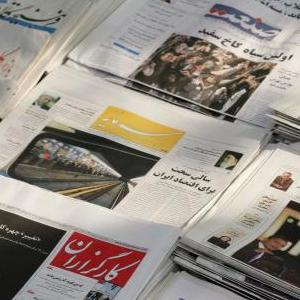Tehran's Daily Newspaper Review

Iran's top headline spoke of “full success of the Purposeful Subsidies Plan”, according to the facts and figures presented by Finance Minister Shamsoddin Hosseini, though to Ahmadinejad's critics, these are neither facts nor true figures. According to Hosseini nearly all commodities, from gasoline to electricity and flour have witnessed a negative or zero rate of growth in consumption and the eight percentiles have enjoyed the cash subsidies. “A new chapter in Tehran-Islamabad-Kabul relations,” the newspaper reported, as Mahmoud Ahmadinejad traveled to Pakistan to visit his Afghan and Pakistani counterparts and discuss terrorism concerns, the battle against narcotrafficking, and energy transfer plans.
Jomhouri-ye Eslami reported of “confessions” made by the Western media on the failure of sanctions against Iran's oil exports and its maritime transportation, quoting Bloomberg and Reuters. The newspaper also spoke of new highs in the price of oil after Iran delivered an ultimatum to six European countries (Greece, Italy, Spain, Portugal, France and Netherlands) and set new stipulations for resumption of oil sales. “The Western-Israeli plot against Syria should be aborted,” the newspaper quoted Hezbollah Leader Seyyed Hassan Nasrullah. The newspaper’s editorial slammed Assad for asking for a deal with the revolution leaders, and warned about appropriation of the regional revolutions by the US and Israel.
Jimmy Carter’s “late warning” to the US Congress not to “downplay” the Occupy Wall Street Movement was Kayhan’s top headline on Saturday. Oil reaching 122 USD a barrel was regarded as “the first outcome of Iran's decisive actions” in warning six European countries on following EU plans to boycott Iran's oil exports. “Arab leaders are fighting Syria instead of Israel,” Kayhan quoted Hassan Nasrullah. The newspaper also covered international reaction to Iran's newly unveiled nuclear achievements.
“We possess certain weapons to surprise the Zionist Regime,” Resalat quoted Seyyed Hassan Nasrullah, who was speaking to a crowd of supporters on the anniversary of the assassination of Seyyed Abbas Mousavi, former Hezbollah leader, by Israel. Nasrullah also promised to exact revenge from Israel for the murder of top Hezbollah commander Imad Mughniyah. Resalat also reported from Islamabad, where Mahmoud Ahmadinejad promised the “expelling” of extraregional powers from the Middle East. “An all-out war against Iran is in operation,” the newspaper quoted Intelligence Minister Heydar Moslehi.
Shargh’s top headline also came from Moslehi’s remarks, where he accused certain “insiders” –loyalists inside the establishment- of buying gold coins worth billions of Tomans, thus fueling the economic unrest in Tehran in past weeks. Shargh also provided prominent coverage for the resignation of German President Christian Wulff, which, juxtaposed to the domestic news on economic tumult and corruption, appeared quite eye-catching and meaningful. “Questioning the president in parliament will create crisis in the country,” the newspaper quoted Gholam-Hossein Elham, one of Ahmadinejad's closest aides in his first cabinet.
“Israel is the loser in war with Iran,” Vatan-e Emrooz quoted John Bolton, calling him “an American warmonger”. Iran's stipulation for resumption of oil sales to European countries, the Greco-Roman wrestling team’s championship in the Asian cup, Nasrullah’s warning about the “evil alliance” against Syria, and Heydar Moslehi’s remarks –on Google’s special services to the United States government, the controversial attendance by former Culture Minister (in the Khatami, administration) Ataollah Mohajerani in Saudi King Abdullah’s annual feast, and the enemy’s plots for the ninth parliamentary election- were also covered by the newspaper.
* Notes:
The editorial section of Iranian newspapers is not the work of the editor-in-chief or the senior editorial staff of the newspaper by default, but can be a contribution by experts and politicians (typically agreeing with the newspaper’s political stance.) The newspapers may also occasionally publish without an editorial.
Vatan-e Emrooz daily does not publish on Thursdays.
Trouble with understanding some terms? Check our Glossary of Iranian Political Terms.
Briefing
Iran is the official organ of the administration. Its current editor-in-chief is Ali-Akbar Javanfekr, former media advisor to President Mahmoud Ahmadinejad.
Jomhouri-ye Eslami (The Islamic Republic) was known as the official organ of the Party of the Islamic Republic, founded in 1979 and disbanded in 1987. Currently, it is an open critic of Mahmoud Ahmadinejad's policies and is known to be a mouthpiece of Akbar Hashemi Rafsanjani.
Kayhan (Universe) is a hard-line conservative newspaper. Its editor-in-chief –currently Hossein Shari’atmadari- is directly appointed by Iran's Supreme Leader. Shari’atmadari’s editorials often spark off controversy and debate inside Iranian political circles.
Resalat (Mission) belongs to the moderate wing of the Principlist camp. Resalat’s best known analyst is Amir Mohebbian, its political editor.
Shargh (East) is a moderate Reformist newspaper. It was the most popular and influential Reformist newspaper in its first period of publication which lasted from August 2003 until September 2006.
Tehran-e Emrooz (Tehran Today) is a “Principlist/Reformist” newspaper, connected to Mohammad Baqer Qalibaf, Tehran Mayor and a likely candidate of the 2013 presidential election.
Vatan-e Emrooz (Motherland Today) is a supporter of the president’s policies.

